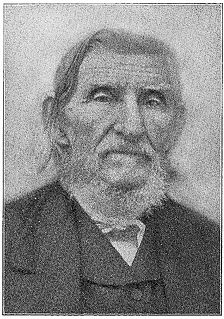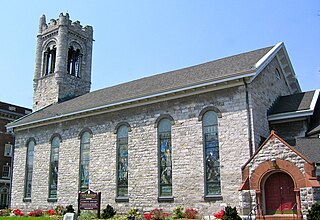Related Research Articles

Gettysburg is a borough and the county seat of Adams County in the U.S. state of Pennsylvania. The Battle of Gettysburg (1863) and President Abraham Lincoln's Gettysburg Address are named for this town. The town hosts visitors to the Gettysburg National Battlefield in the Gettysburg National Military Park. As of the 2010 census, the borough had a population of 7,620 people.

The Lutheran Theological Seminary at Gettysburg was a seminary of the Evangelical Lutheran Church in America (ELCA) in Gettysburg, Pennsylvania. It was one of seven ELCA seminaries, one of the three seminaries in the Eastern Cluster of Lutheran Seminaries, and a member institution of the Washington Theological Consortium. It was founded in 1826 under prominent but controversial theologian and professor Samuel Simon Schmucker (1799-1873) for the recently organized General Synod of the Evangelical Lutheran Church in the United States. The seminary was the oldest continuing Lutheran seminary in the United States until it was merged on July 1, 2017, after 189 years of operation, with the nearby and former rival Lutheran Theological Seminary at Philadelphia to form the United Lutheran Seminary. The new institution continues to use both campuses.

Samuel Simon Schmucker was a German-American Lutheran pastor and theologian. He was integral to the founding of the Lutheran church body known as the General Synod, as well as the oldest continuously operating Lutheran seminary and college in North America.

Daniel Alexander Payne was an American bishop, educator, college administrator and author. A major shaper of the African Methodist Episcopal Church (A.M.E.), Payne stressed education and preparation of ministers and introduced more order in the church, becoming its sixth bishop and serving for more than four decades (1852–1893) as well as becoming one of the founders of Wilberforce University in Ohio in 1856. In 1863 the AME Church bought the college and chose Payne to lead it; he became the first African-American president of a college in the United States and served in that position until 1877.

Charles Porterfield Krauth was a pastor, theologian and educator in the Lutheran branch of Christianity. He is a leading figure in the revival of the Lutheran Confessions connected to Neo-Lutheranism in the United States.

John Christian Frederick Heyer was the first missionary sent abroad by Lutherans in the United States. He founded the Guntur Mission in Andhra Pradesh, India. "Father Heyer" is commemorated as a missionary in the Calendar of Saints of the Lutheran Church on November 7, along with Bartholomaeus Ziegenbalg and Ludwig Ingwer Nommensen.

William Alfred Passavant was a Lutheran minister noted for bringing the Lutheran Deaconess movement to the United States. He is commemorated in the Calendar of Saints of the Lutheran Church on November 24 with Justus Falckner and Jehu Jones. He is also honored with a Lesser Feast on the liturgical calendar of the Episcopal Church in the United States of America on January 3.

Beale Melanchthon Schmucker was an American Lutheran leader, liturgical scholar and historian.

The Pennsylvania Ministerium was the first Lutheran church body in North America. With the encouragement of Henry Melchior Muhlenberg (1711–1787), the Ministerium was founded at a Church Conference of Lutheran clergy on August 26, 1748. The group was known as the "German Evangelical Lutheran Ministerium of North America" until 1792, when it adopted the name "German Evangelical Lutheran Ministerium of Pennsylvania and Adjacent States".
The Evangelical Lutheran General Synod of the United States of America, commonly known as the General Synod, was a historical Lutheran denomination in the United States. Established in 1820, it was the first national Lutheran body to be formed in the U.S. and by 1918 had become the third largest Lutheran group in the nation. In 1918, the General Synod merged with other Lutheran denominations to create the United Lutheran Church in America. Both the General Synod and the United Lutheran Church are predecessor bodies to the contemporary Evangelical Lutheran Church in America.

Luther Alexander Gotwald, D.D. was a professor of theology in the Wittenberg Theological Seminary in the United States. He was tried for heresy by the board of directors at Wittenberg College in Springfield, Ohio, on April 4 and 5, 1893, which put on trial many key issues that Lutherans still debate today.

Benjamin Kurtz was a German-American Lutheran pastor and theologian. He was part of the revivalist movement of the Lutheran Church in the 19th century, ran the Lutheran faith-based newspaper Lutheran Observer, founded the Lutheran faith-based Missionary Institute in Selinsgrove, Pennsylvania, and assisted in the founding of the Gettysburg Seminary.

Zion Reformed United Church of Christ, originally The German Reformed Church was founded in 1770 in Hagerstown, Maryland. The church, at 201 North Potomac Street, was the first within the town limits. It is the oldest church building in Washington County, Maryland that has been in continuous use as a church since its construction. During the American Civil War, the church’s bell tower was used as a lookout by Union troops under the command of General George Custer.
David Frederick Schaeffer was a Lutheran clergyman of the United States.

Charles Frederick Schaeffer was a Lutheran clergyman of the United States.
Charles William Schaeffer was a Lutheran clergyman and theologian of the United States.
Frederick Rinehart Anspach was an American Lutheran clergyman, author and editor.
Charles Philip Krauth was a Lutheran clergyman of the United States. He was the first president of Gettysburg College 1834–1850.

John Gottlieb Morris was a Lutheran minister who played an influential role in the evolution of the Lutheran church in America. He was also an early American entomologist and a regional specialist in the study of Lepidoptera.
Peter Schmucker (1784–1860) was a Lutheran and later Methodist minister, who served congregations first in Virginia, then in Pennsylvania, Ohio, and other western states.
References
- This article incorporates text from a publication now in the public domain : Wilson, J. G.; Fiske, J., eds. (1900). . Appletons' Cyclopædia of American Biography . New York: D. Appleton.